Craig Tiley says the Australian Open covered expenses for Ukrainian players and their teams
Tennis Australia boss Craig Tiley has called on every tournament to follow the Aus Open’s suit, by making a key sacrifice for Ukrainian players who can’t return to their homes.
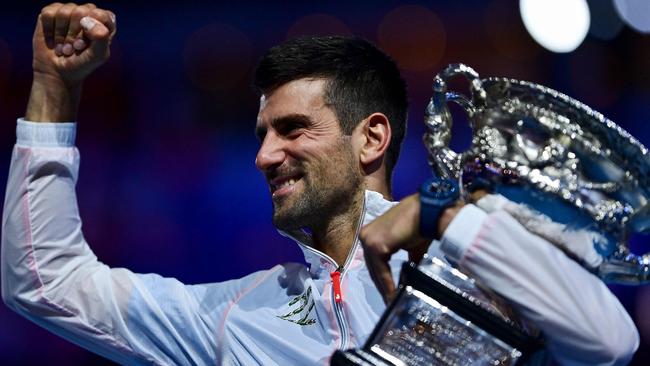
Tennis
Don't miss out on the headlines from Tennis. Followed categories will be added to My News.
Tennis Australia boss Craig Tiley will rally international tennis bodies to do more for Ukrainian players.
Speaking in the wake of this week’s pro-Russian demonstration furore that engulfed the Australian Open, Tiley said more could be done to support players and their teams who are unable to return to their war-torn homes.
Tiley said the Australian Open had footed the bill for Ukrainian players and their teams at this grand slam, but conceded tennis had to step up after a meeting with one coach — in the wake of a Russian flag being displayed at a Ukrainian player’s match in the opening round — who hit the tournament director with the reality that comes with being on the tour.
“We covered the expenses of all the Ukrainian teams while they were here … I think the sport should look at that right throughout the year,” Tiley told News Corp.
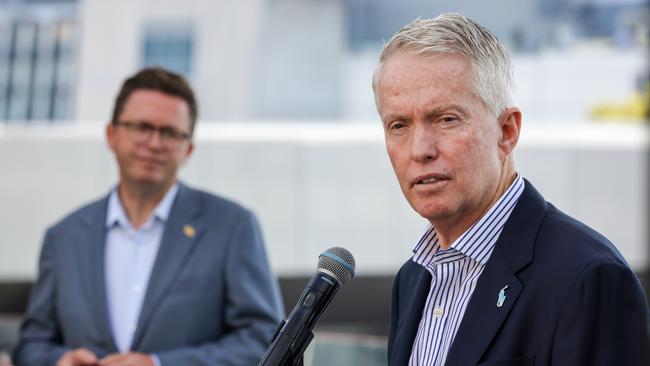
“I think every tournament should look at it.
“I met with one of the Ukrainian coaches and it was a very emotional meeting. This was in the first week, after the Russian flag incident.
“He was telling me stories about (how) everyone else can go home. And he can’t. His player can’t, their family can’t. They’ve got no home to go to.
“So they go to the next tournament next week, and that for that week is their home.”
The Australian Open boss said there was no way of understanding what they endure “until it’s happening to you”.
“It was a good moment for me personally, because it made me question, ‘are we doing enough?’.
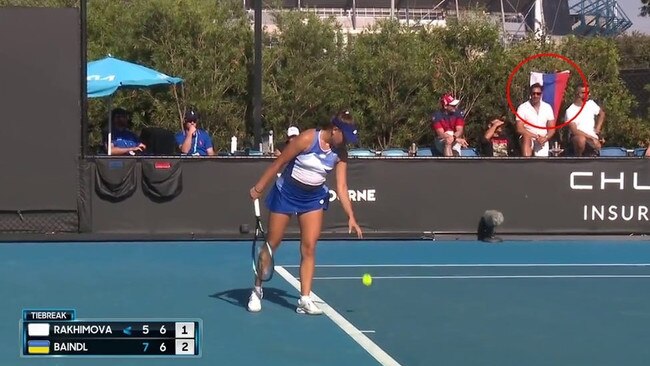
“I haven’t spoken with the other leaders in tennis, but I will be having a conversation about exploring how we do even more for the Ukrainian players.
“Maybe there’s a situation where every tournament every week completely funds it – I don’t know what it is. Something, but more, because it doesn’t look like this is going to stop any time soon, and they have a tough go.”
Novak Djokovic’s father, Srdjan, was this week accused of showing support to pro-Putin demonstrators that had gathered at Melbourne Park.
Tennis Australia’s stance in the wake of the incident was criticised, including by Ukraine’s ambassador to Australia, who Tiley spoke with this week.
But the tournament chief stood by his body’s response to the incident.
“We made our position clear on it, that we’re absolutely against war,” he said.
TEAM DJOKOVIC DRAMA EXPLAINED: PUTIN, DAD, INJURIES, HISTORY
Julian Linden
Novak Djokovic said he was able to share an emotional moment with his father shortly after his historic victory at the Australian Open on Sunday, but said he was still hurt that his dad did not watch the match along with other family members.
Djokovic said he and his father Srdjan both agreed it was best if he did watch the final against Stefanos Tsitsipas from the VIP player’s box after he was photographed with supporters of Russian president Vladimir Putin.
They did meet up at Melbourne Park shortly after Djokovic sealed his straight sets win but the Serbian tennis star said it was a bittersweet reunion.
“Yes, we talked. I thought things will calm down in terms of media and everything, but it didn’t. We both agreed it would probably be better that he is not there,” Djokovic said.
“That hurts me and him a lot because these are very special, unique moments. Who knows if they repeat again. So it was not easy for him.
READ THE FULL POST-MATCH INTERVIEW WITH TEAM DJOKOVIC BELOW
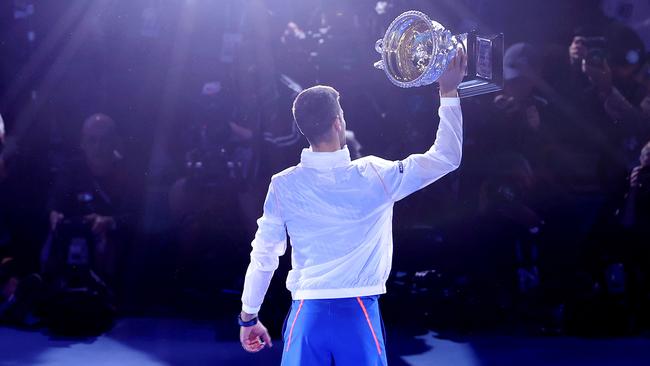
“I saw him after the match, of course. Yeah, he was not feeling his best, let’s say, even though he was very happy to hug me and of course with everything. I could see that, yeah, he’s a bit sad.
“Look, it is what it is. I think in the end also what he told me is that it’s important that I feel good on the court, I win the match, and he’s here for me. If it’s going to be better for me as the outcome of the match so that he’s not in the box, then so be it. That was the whole conversation.
“In a way I’m also sad that he was not there, present, in the stands. But he was throughout the entire tournament, so it’s fine. In the end we have a happy ending.”
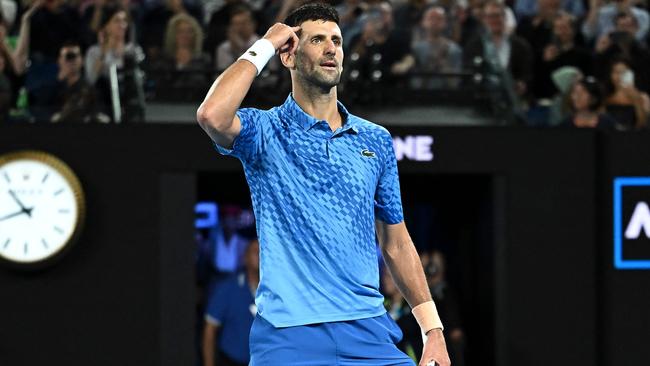
FULL TRANSCRIPT FOR DJOKOVIC AND HIS COACH GORAN IVANISEVIC
Q. You said on the court the last four to five weeks what it’s been like for you. Can you take us through that.
NOVAK DJOKOVIC: Yeah, just a huge pride and satisfaction that I feel at the moment. Of course, when I went into my box, I just think emotionally collapsed there and teared up with especially my mother and my brother, when I gave them a hug, because up to that moment I was not allowing myself to, I guess, be distracted with things off the court or whatever was happening in dealing with an injury, things happening off the court, as well, that could easily have been a big disturbance to my focus, to my game.
It required an enormous mental energy really to stay present, to stay focused, to take things day by day, and really see how far I can go.
If I turn back the time two and a half weeks ago, I wasn’t really liking my chance in this tournament with the way I felt with my leg. Then it was just a matter of survival of every single match, trying to take it to the next round.
The good thing about the Grand Slam here is that you have a day between the matches, so it allowed me to have more time than normally on some other tournaments to recover, to try to do all the treatments in order to get myself in somewhat of a good state and condition to play and eventually win.
From fourth round onwards, I feel the leg was not bothering me as much. I felt my movement was much better. I played some of my best tennis honestly in Australian Open. The fourth round, quarterfinal, semifinals, just really comfortable on the court, hitting the ball great. I knew that against Stefanos, it’s going to be different match than what I had throughout the entire tournament.
I saw him play. I saw how dominant he was, as well. I knew that it’s going to be a big challenge and that I have to stay tough. That’s what I’ve done.
I think I started off really well. Pretty short time for the play of the first set, I think about 30, 35 minutes. Then second set he was a better player. He had his chances. Didn’t use them. He had a set point. I just held my nerves in both tiebreaks in second and third.
Yeah, was a huge relief and release of the emotions in the end. Yeah, just difficult to find any additional words really. It’s been a long journey, but very special one.
Q. In the second set there were quite a lot of words and looks between yourself and I think Goran. What was happening there?
NOVAK DJOKOVIC: No, it was Goran and other members of my team. Just a normal chatter that we would normally have in the court where I was not comfortable and was looking for some help and some advices, some guidance. That’s all it is.
Obviously on the court, difficult to explain to people that have not been in these situations what you go through. So of course I know that, as I said on the ceremony, they tolerate a lot of things that I do to them, say to them, and I’m really grateful to have their presence and their support, just the way they are.
If I’m in the box, and a guy is doing that to me, I’ll probably act differently (smiling).
Q. You talked about the emotions at the end there. How much of that was what happened last year, coming back here, the injury, other off-court stuff? Was it a combination of everything?
NOVAK DJOKOVIC: It is. Coming into Australia was something I was looking forward to because, I said it before, I honestly feel great in Australia. My results are a testament to that. I really wanted to be back here. I wanted to play.
Knowing my records in Australian Open, I always like my chances. I ended up the last season in best possible way. I played great. I did a great preparation.
Of course, considering last year’s event, I was a bit more nervous coming into Australia, didn’t know how I was going to be received by the people. But overall it was a very positive experience.
Again, I wouldn’t be able to do what I did in Adelaide and here if I wasn’t feeling good on and off the court. Of course, there were things that were happening, also events of last few days with my father, that were not easy for me to handle, especially at these last stages of a Grand Slam. But I had to keep it together.
That’s why I said in answering the first question that it took enormous amount of mental and emotional energy to really keep it tight, keep my focus.
People around me who have been with me have done a great job in making me do my routines in a proper way so that I could try to perform the best way as possible.
Q. You’ve spoken in the past openly of being motivated by history. We think of the duel now with Rafa now that you both have 22 slams. Are you motivated by ending your career with more Grand Slams than everybody? By that I mean even Serena and Margaret Court.
NOVAK DJOKOVIC: Of course I am motivated to win as many slams as possible. At this stage of my career, these trophies are the biggest motivational factor of why I still compete. That’s the case without a doubt.
I never really liked comparing myself to others, but of course it’s a privilege to be part of the discussion as one of the greatest players of all time. If people see me this way, of course it’s very flattering because I know that I give as much effort and energy into trying to win slams as anybody else.
I still have lots of motivation. Let’s see how far it takes me. I really don’t want to stop here. I don’t have intention to stop here. I feel great about my tennis. I know that when I’m feeling good physically, mentally present, I have a chance to win any slam against anybody.
I like my chances going forward. But, again, nothing is given or nothing is for granted. Of course, awareness there’s a lot of players that want this trophy or want the No. 1 position in the world.
I’ve been so many times in these situations, that experience, and just, I guess, being in those circumstances, in those shoes, helps me always to kind of keep my mind fresh and know what’s expecting me.
I don’t know how many more years I’m going to play or how many more slams I’m going to play. It depends on various things. It doesn’t depend only on my body. I think it’s extremely important for me to be, of course, first to have the support and love from the close ones, and ability to go and play and keep the balance with the private life, but at the same time have the mental clarity or – how should I say – aspirations to really strive to chase these trophies.
Physically I can keep myself fit. Of course, 35 is not 25, even though I want to believe it is. But I still feel there is time ahead of me. Let’s see how far I go.
Q. When the match ended, you looked at your box and pointed to a few different places. What were you trying to say?
NOVAK DJOKOVIC: What do you want me to say? You’ve seen it all (smiling).
It’s a little code language we have. They understand. It takes, yeah, big heart, of course a lot of mental strength, and the third thing as well to make it.
Q. Have you learned anything about yourself over the last fortnight on the court but also off the court? Your level of tennis, where does it sit compared to the semifinal in 2016 against Federer?
NOVAK DJOKOVIC: Well, in terms of learning about myself, I always try to take away some important professional tennis lessons but also life lessons about my character, about my experience, about everything that I went through on and off the court. So I need some time. I need some space to reflect on that. It’s hard to talk about it right now because it’s so fresh.
In terms of the quality of the tennis, it’s honestly some of the best tennis I’ve played on this court. As good as I’ve played maybe 2011 or ‘15 or ‘16 or those years where I really had some very strong, strong seasons and strong Australian Opens. I would rank it right up there. Maybe top two, three of all time of performances on slams in general, particularly here.
Q. You joked about 35 and 25. What significance does it have to you at this age to both still be winning these things and also now to get to return to No. 1?
NOVAK DJOKOVIC: Well, even more than probably 10 years ago, because you never know how much more time you have left. So, of course, I nurture and celebrate these moments of becoming No. 1 again and Grand Slam champion even more than I have maybe ever in my career. I don’t take it for granted.
As I said, it’s just so fresh. I just came off the court. Of course, I have to reflect and sleep over a few nights and just realise what I’ve been through with my team. Of course, it makes me incredibly proud, but it also is a huge relief because it hasn’t been smooth sailing, so to say, on and off the court in the last three to four weeks.
That makes this victory even more special.
Q. You touched on it a couple nights ago, you hoped your dad would be in the stands for tonight’s final. That obviously didn’t happen. Can you explain why he didn’t end up in the stands? How special was it to see him after you left the court?
NOVAK DJOKOVIC: Yes, we talked. I thought the things will calm down in terms of media and everything, but it didn’t. We both agreed it would probably be better that he is not there.
That hurts me and him a lot because these are very special, unique moments. Who knows if they repeat again. So it was not easy for him.
I saw him after the match, of course. Yeah, he was not feeling his best, let’s say, even though he was very happy to hug me and of course with everything. I could see that, yeah, he’s a bit sad.
Look, it is what it is. I think in the end also what he told me is that it’s important that I feel good on the court, I win the match, and he’s here for me. If it’s going to be better for me as the outcome of the match so that he’s not in the box, then so be it. That was the whole conversation.
In a way I’m also sad that he was not there, present, in the stands. But he was throughout the entire tournament, so it’s fine. In the end we have a happy ending.
Q. You mentioned on the court how you and Stefanos represent smaller countries. 22 slams later, what do all these victories mean to people back home?
NOVAK DJOKOVIC: I probably don’t know fully how it resonates with people. I truly believe and I hope that, especially young people in Serbia, find a lot of inspiration in what I do, what I have achieved, so it motivates them to grab a racquet or whatever they do, whether it’s sport or any other area of life.
As I said on the court, dream big and nurture those dreams. We heard the story before, but it truly is like cliche, but it is true. Coming from countries like Serbia and Greece, in Stefanos’ case, with almost zero tennis tradition and support in any shape or form for the tennis, it makes adversity far bigger challenge to reach the big heights and great heights.
You kind of have to pave your own way and become the first in something – of course, along with your family and close people in your life and your coaches.
But that makes the whole experience even more unique and gratifying. I think for me appreciation for everything that I have achieved in life is greater because of knowing how I started.
Serbia and Greece, as I said it, we have great relationship historically between the countries. So as I have with Stefanos personally, of course we are great rivals, but we had some nice words for each other on the court.
I think it’s important. It’s important to be kind and respectful in those moments. Regardless of the score, you want to win without a doubt, everybody knows that. You’re a fierce competitor, but you should always have some respectful words for your opponent and understanding of what he goes through because you can relate to a lot of the things that your peers are going through because you know how tough it is.
GORAN IVANISEVIC
Q. He said he thought maybe he wouldn’t be able to play here. How close was he to potentially not playing the tournament?
GORAN IVANISEVIC: Let me put it like this. I don’t say 100%, but 97% of the players, on Saturday when you get results of the MRI, you go straight to the referee office and pull out of the tournament. But not him.
He is from other space. His brain is working different. I’m with him four years, but it still sometimes how his brain work.
He gave everything. 77 therapies a day. Every day was kind of better and better. I didn’t expect this. Honestly, I was shocked. Okay, first two rounds okay, but then against Dimitrov was very scared.
But he got through and in the end he won the tournament.
Q. When we spoke to Novak the other day, he said that not having his dad present for the semifinal had affected him. Can you give us insight how difficult it must have been for him emotionally?
GORAN IVANISEVIC: It is difficult. You could see today okay, but match against Tommy, he was more emotional. 5-1, 5-All. Novak doesn’t do that. When he leads 5-1, he wins 6-1. He doesn’t get back to 5-All. Doesn’t matter who he plays.
But you know things happens. Fortunately he was able to win a tournament even with all this craziness around. It’s unbelievable achievement.
Q. You’ve worked with Novak for a while. Have you learnt anything new about him during this tournament?
GORAN IVANISEVIC: You learn all the times. He’s getting crazier and crazier, I can say that (laughter). It’s no end of the field of craziness. In a positive way, I mean (smiling).
I mean, the guy is unbelievable. I don’t know how to describe in the words. I thought I saw everything, and then you see this. Probably I going to see something else.
Unbelievable. I know he’s emotional on the court. Doesn’t matter. We talk, he talks. But, like I said before, how he won the tournament, how he played also today in the moments was good tennis, in the moments was bad tennis, but doesn’t matter, overall he won 10 Australian Open.
Battle of Spain against Serbia, it’s like a handball match. 22-22 for the moment. Now it’s going to be interesting this year.
Q. He’s always apologising to you after these matches, saying how difficult he is to deal with. Is he really that difficult? What is he referring to?
GORAN IVANISEVIC: I mean, I can talk about that for 10 days. I mean, I was tennis player. I was also little bit crazy. I understand how he feels. I understand the emotions.
This is final of Grand Slam. I don’t mind. If this going to help him, we already talk it so many times. I don’t mind.
I told him, You can tell me whatever you want, but you have to win, otherwise you have a problem. As long as he wins, is okay (smiling).
But he’s okay. Last year was not easy. Nothing is easy. But he’s the same like if you are a coach, football coach of Real Madrid, you need to have the pressure. If you don’t win one, two games, you get fired.
In his tennis life, it’s nice to be in the final, but in the end you need to win. Only Grand Slam counts, only record counts. But it’s a good challenge. I already used to it. I am four years there in the team. It’s okay. I’m used to it.
Q. Have you been especially impressed today by his forehand?
GORAN IVANISEVIC: I’ve been impressed by his forehand all this year. Actually we work a lot. Let’s say in Torino he start to hit the forehands, but we work a lot in the pre-season. Adelaide was not bad.
But here kind of when he got injured, he needed to be more aggressive. He stepped up and he was smacking forehands unbelievable. Really probably the best two weeks of forehands that I ever saw him in his life. I mean, I never saw him hitting better forehands before. He was really going for it.
Today was probably I have to say maybe the worst forehands from all these matches. But still, when he needed, he played great tennis and he was hitting good forehands.
Q. You mentioned 22-22 between Novak and Rafa. Novak is nearly 36 now. You have some young players that are 19. How long do you think he can stay at his top level?
GORAN IVANISEVIC: Definitely two, three more years. The way he’s taking care of his body, the way he approach about everything, the food, it’s amazing. It’s unbelievable the level.
We talking about young guys. They’re here, it’s great for tennis, great for the future of tennis. But you still have these two guys battling. This was Novak home court, and now we going next one to Rafa home court in this handball match of 22-22.
Yes, they are coming, Alcaraz, unbelievable. Still, if Rafa steps on the court on the French Open, for me he’s always the favourite to win the tournament.
There are a lot of guys who can beat him, also Novak. But Rafa, it’s 14 times to win a tournament. You cannot even win a tournament at home in the (indiscernible) 14 times in a row. It’s amazing. They really push each other.
It’s good that we have a lot of young guys. We have Stefanos who is going to win Grand Slam definitely one day because he’s just amazing player.
Q. Can you talk us through after the match when Novak came up to the box, we’ve never really seen him that emotional after a slam win, did that shock you?
GORAN IVANISEVIC: Actually, yes and no. Everything, he’s keeping everything inside. Sometimes you have to explode. Surprisingly he was very quiet for one set and a half. He didn’t say one word for the final. He letted everything out.
It was very emotional, very emotional for us, very emotional for him. It’s a great achievement. It was really tough three weeks for him. He managed to overcome everything.
Q. You talked about the French Open. How special would it be if Novak was able to get the 23rd?
GORAN IVANISEVIC: I said eight or nine years ago that Novak and Rafa will go over Roger. Back then they were, No. People were looking at me like strangely. But we have 22-22. Two unbelievable competitors, two unbelievable tennis players, what they did for the tennis.
I’m looking forward. Looking forward, honestly, for both of them to be super healthy, then battle is there. And with the young guys who going to try to find backdoors to sneak and try to do something.
But still these two guys, they going to have last word to say there.





